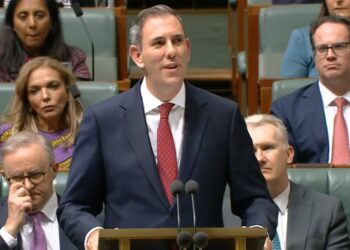Despite a surplus of $9.3 billion, Treasurer Jim Chalmers confirmed on Tuesday that the return to black would only be temporary and that bigger deficits would ensue, as the $9.3 billion is likely to be wiped out quickly by government spending on things deemed “unavoidable”, such as its Future Made in Australia Act.
While the budget featured a headline-worthy $7.8 billion cost-of-living relief package, which includes an electricity rebate for all Australians, on top of the already announced changes to stage three tax cuts, sweet potatoes got more mentions in the budget than financial advice.
One could argue that the present moment would have been an opportune time to introduce regulatory relief for the advice profession, fix the problems with the Compensation Scheme of Last Resort (CSLR), the Australian Securities and Investments Commission (ASIC) funding levy, the financial advice exam cost, and Australian Taxation Office (ATO) portal access, among others.
Namely, as previously discussed, levies paid by financial advisers are expected to rise significantly with the additional CSLR burden.
But rather than heeding the advice of industry groups, Labor appears quite pleased with both the ASIC and CSLR funding models – so much so that ASIC levies may increase further after the regulator received additional funding in the budget.
Taking to LinkedIn over the weekend, Phil Anderson, FAAA general manager policy, advocacy and standards, said that the “CSLR and Dixon Advisory debacle has been a progressively exploding disaster”.
Little did Anderson know at the time that the other ASIC costs would actually increase in the budget, potentially indicating even higher levies. Namely, Tuesday’s budget did mention ASIC levies, once, to indicate that they would now fund ASIC’s greenwashing initiatives.
To be precise, according to the budget papers, ASIC would receive $10 million in 2024–25 in additional resourcing to investigate and take enforcement action against market participants engaging in greenwashing and other sustainability-related financial misconduct. This funding, the papers confirm, would be cost recovered through levies under ASIC’s industry funding model.
Moreover, ASIC, alongside the Australian Prudential Regulation Authority, is receiving $206.4 million over four years from 2024–25 to improve its data capability and cyber security and to continue the stabilisation of business registers and modernisation of legacy systems. This, too, could be partially charged to advisers.
So, as anticipated, it would appear that the cost of providing advice is on track to significantly increase for advisers, potentially exacerbating the gap between Australians and access to advice.
So, what did advisers receive from Tuesday’s budget?
Well, to be honest, not much.
Areas that may ease the burden include the instant asset write-off scheme for small businesses, which has been extended for another year. This means businesses with a turnover of less than $10 million will be able to claim $20,000 from eligible assets.
However, although this was also announced in last year’s budget, it has yet to be legislated. So, what relief this will actually provide is questionable.
Advisers who run a small business may also be eligible for an energy rebate, but again, that is reserved for 1 million small businesses.
Individually, all advisers, alongside the broader Australian community, will receive an automatic $300 energy rebate and a possible tax cut, depending on their earnings.
However, what advisers are really waiting for is word on the Quality of Advice Review – the one that the government has been sitting on for months, oh wait, years.
Given that the budget is now out of the way, perhaps Minister Stephen Jones will pay some more attention to solving the “hot mess”?
Editor’s note: If this piece sounds familiar, it’s because a very similar piece was published a year ago. The idea being that advice still remains on the outskirts of the government’s focus.




If the lack of attention in this budget to the regulation of advice, and in particular the issue of full tax deductibility for advice fees, concerns you, then you need a better, more aggressive and determined representative body representing advisers. What we have now are basically pussycats, comfortable in their environment, running a closed shop where criticism is not welcome. Not really rocking the boat! And very predictable.
The squeaky wheel gets the attention in politics. Every industry in this country knows how that works – you either engage high-powered lobbyists with influence and party connections or you set up an office in Canberra and walk the corridors of Parliament House with an orange pass around your neck, boring everybody witless. The industry superfunds use that tactic I coalition government with apparent success.
Nothing is going to change if we are nice to government because any threat we hold to the body politic will always be contained. Not if we continued to release press releases that aren’t really nasty. Not if we put 20 page submissions to government knowing full well that that submission will not be read by the Minister but will go straight to his department for a “response”, to be buried with everything else.
Where for example were anyone from our professional bodies in the media lock-up, giving snappy interviews and opinions in the corridors after the speech. Every other lobby group in the country was there, but not us. Are any of our professional bodies represented on one of the hundreds of tables in the great Hall of Parliament House as Jim Chalmers is speaking, paying for an opportunity to get in the ear of the Minister or the Treasury official on your table. Don’t be silly!
Nothing will change easily in our industry. I’d like a dollar for every Minister for Financial Services that has haunted Parliament in my time as an advisor. They come and go, pretend to listen, make sympathetic noises at the occasional conference , and bugger off for a promotion just as it looked like he/she might be listening. Or they get booted out like Jane Hulme one of the lesser lights to graze the portfolio.
What did Einstein say about repeating the same measure?